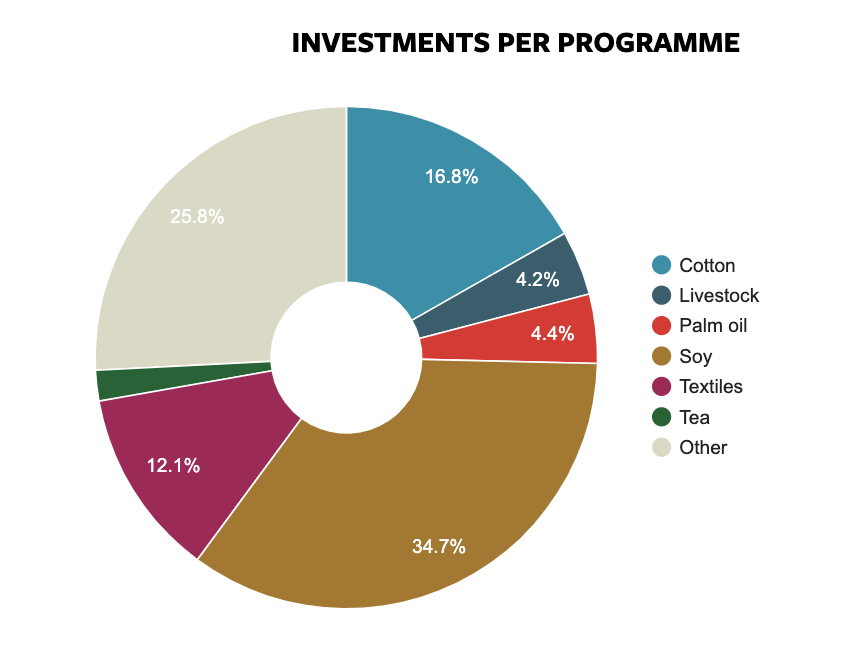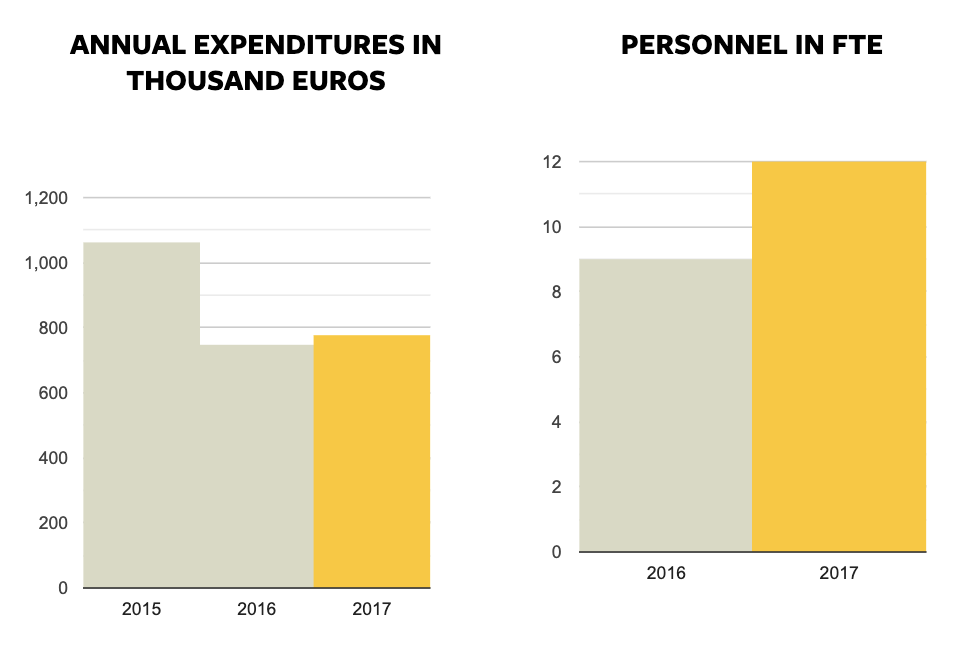The cotton project focuses on reducing the application of fertilizers and chemicals, mainstreaming water-saving technologies and integrated pest management techniques. In addition, this project promotes decent work and field management for improving fibre quality. It also provided technical training and support to 1,650 farmers in cultivating sustainable cotton in Guazhou City of Gansu Province with a total area of 1,35.86 hectares.

Together with Cargill China, Solidaridad co-organized a Chinese pork delegation trip to Brazil to better understand the developments in Brazil’s agriculture and sustainability in regards to pork production and sourcing of raw materials for feed. With new environmental regulations in agriculture and pork, companies are exploring ways to reduce their environmental footprint and source feed materials, such as soy in a responsible way.

As one of the co-founders of the Sustainable Soy Trade Platform, Solidaridad led two delegation trips to the Netherlands and Argentina with participants from COFCO, Yihai-Kerry (Wilmar), Sinograin, Jiusan Group and Hopefull Group, accounting for over 60% of China’s annual soy trade volume. The intention of this was to facilitate cross-regional dialogue and build consensus on the deforestation and sustainability issues in the soy supply chain with the South American and Chinese soy stakeholders.

The Better Mill Initiative led to a total of 80 improvement measures being implemented by eight mills over 15 months. This covered seven targeted topics of water and energy consumption, wastewater, air emissions, solid waste, chemical management, and occupational health and safety. Improvements achieved in 2017 translated to savings of 2 million tonnes of water, 17,000 tonnes of CO2 emissions reduction and 23.67 million Chinese yuan (RMB) in costs. The Better Mill Initiative online tool has been developed and is now under further improvement.

DEVELOPMENTS
Recent developments in China include a commitment to:
- Accelerate the establishment of a legal system and policy orientation for green production and consumption, and establish and improve an economic system with a green and low-carbon cycle
- Build a market-oriented green technology innovation system, develop green finance, and strengthen energy-saving and environmental protection industries, clean production industries, and clean energy industries
- Promote the revolution in energy production and consumption and build a clean, low-carbon, safe and efficient energy system
- Promote comprehensive conservation and recycling of resources, implement national water-saving actions, reduce energy consumption and material consumption, and realize circular links between production systems and living systems.
By implementing capacity building approaches, Solidaridad has been working with key stakeholders, including policy-makers, industrial associations, businesses, farmer associations and smallholder farms to enhance their capacity in promoting green and low-carbon development. In addition, providing support to pursue green production in the field of manufacturing, agriculture and international commodity trade. This will effectively benefit the long-term environment and social sustainability.

ACHIEVEMENTS
In 2017, the cotton project supported 1,650 farmers in cultivating sustainable cotton in Guazhou City with a total area of 1,35.86 hectares. The project focussed on reducing the application of fertilizers and chemicals, promoting water saving technology and integrated pest management techniques as well as decent work and field management for improving fibre quality. At the end of 2017, a total of 7,085 tonnes of seed cotton was certificated by the Better Cotton Initiative.
As one of the co-founders of the Sustainable Soy Trade Platform, Solidaridad led two delegation trips, with participants from COFCO, Yihai-Kerry (Wilmar), Sinograin, Jiusan Group and Hopefull Group, accounting for over 60% of China’s annual soy trade volume. This trip was to both the Netherlands and Argentina to facilitate a cross-regional dialogue and build consensus on deforestation and sustainability issues in the soy supply chain with South American and Chinese stakeholders.
Under the Code of Responsible Extraction (CORE), one of the first independently auditable global codes for minerals at the extraction site developed in Asia, there have been two mine entities certified by independent third-party certification bodies. A total of two CORE training workshops on three topics have been organized, with 15 mine managers having participated.

PARTNERSHIPS
Solidaridad continued to work with a range of donors and partners (e.g. Unilever, CCCMC, H&M, C&A, Cleaner Production Center of Zhejiang University, STS, Cargill, the Nature Conservancy, WWF China). The Dutch embassy in Beijing continues to be a key partner for soy. The Dutch ministry, the Norwegian Agency for Development Cooperation (Norad), the U.S. Gordon & Betty Moore Foundation, and brands participating in the BMI continued their funding support for REC China projects. Partnership with government-affiliated industry associations including China Tea Marketing Association, China National Vegetable Oils Association, China Soy Industry Association, Heilongjiang Soy Association, China Animal Agricultural Association, were strengthened.
ORGANIZATION
Significant human resource changes at REC China in 2017, caused by a major transition in leadership, resulted in a reduction of seven staff members. The remaining staff members continually participated in the Network-wide activities, including meetings and seminars, and engaged in various task forces and working group activities (e.g. climate change, impact investment, gender and communications).
COMMUNICATION AND CAMPAIGNING
In 2017, Solidaridad China focused on using social media for communications. The efforts included creating and updating Solidaridad’s WeChat and Weibo profiles in China, which are popular and widely used by young and middle-class people in China.
FINANCE AND CONTROL
In 2017, the budget decreased as a result of the recent transition period. Major projects have come to an end and new projects have not been fully developed and contracted.
Expenditures maintained a similar level as that of 2016. Solidaridad China continued to spend surplus budget from 2016, in addition to the 2017 budget.
Solidaridad China worked with other Solidaridad centres around the world to seek opportunities to develop new projects, engage donors. However, due to various reasons, Solidaridad China’s own contracted amount and the number of donors were limited.
The year 2017 maintained the same level of spending as that of 2016, but it was less than in 2015. In 2018, the available budget is expected to be around 600,000 euro as a conservative estimate, in addition to the surplus budget from 2017 amounting to about 270,000 euro.
Considering that 2018 will be a year of rebuilding capacity and implementing new strategies, it could possibly result in a deficit by the end of the year.
